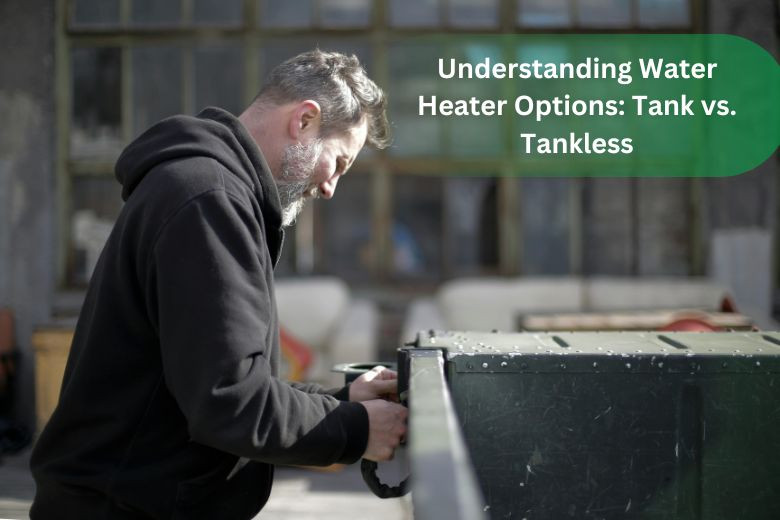Understanding Water Heater Options: Tank vs. Tankless
Posted on August 01, 2024 by Admin

When it comes to having a consistent and efficient hot water supply, getting the right water heater is crucial. Two common styles of available water heaters are: tank and tankless. Both types serve the same purpose of providing constant hot water, but each one has its advantages and limitations. In turn, the following explanation, provided by an experienced Electrician Service Provider, will explore these for you to make the best and informed choice.
Must Read : How to Choose the Right Plumbing Fixtures for Your Bathroom and Kitchen
1. Tank Water Heaters
Tank water heaters—conventionally known as conventional or storage water heaters—have been the long-time standard for hot water provisions. They heat water and then store it in a tank, from where it's constantly available.
Advantages:
- More Affordable Upfront Cost: In most cases, both the buying and installing prices are lower compared to tankless models.
They are also very common among most households because of its simple design, which makes it quite an easy thing to install.
- Constant Supply of Hot Water: If you possess an amount of water in the boiler, then you'd likewise have a constant supply of hot water.
Disadvantages:
- Limited Supply: The supply of hot water is limited since, after the tank empties, you will have to wait for it to fill again and start heating up prior to use.
- High Energy Consumption: They keep on heating the water present in them to maintain the temperature hence consuming more energy and increasing utility bills.
- Bulkier in Size: They occupy quite a lot of space; so, installation may get to be a problem in smaller houses or tightened installations.
Must Read : Understanding the Roof Installation Process: What Homeowners Need to Know
2. Tankless Water Heaters
Tankless water heaters, as the name refers, pass the water to be heated through it without reserving it in a storage tank. They, so, have a number of advantages, resulting in hot water only when needed.
Advantages:
- Energy Efficiency: Tankless heaters are more energy efficient since they use energy only when water is running, which reduces standby heat loss and even, hence, your energy bills.
- Endless Hot Water: You'll never run short of hot water, subject to the provision that the device is sized correctly relative to the dimensions of your house's needs.
- Compact Size: Small-sized, space-saver design that allows more flexible installation options.
Must Read : How to Prepare Your Roof for Severe Weather
Disadvantages:
- Higher Upfront Cost: Generally, it costs more to buy and install than a tank-type water heater.
- Flow Rate Limits: If not appropriately sized, they cannot generate enough hot water with multiple outlets open.- Complex Installation: Tricky to set up. You'll have to modify your electrical or gas systems.
Faqs
-
1. How to decide between tank and tankless water heaters?
It could depend on factors such as how much hot water your household consumes and the budget available at your hand. If you consume vast volumes of hot water and want a more pocket-friendly upfront cost, the right way to go should be a tank water heater. If energy efficiency is your goal but you have limited space, then a tankless water heater could be a great place to look. When making the right decision for yourself, there will have to be a consideration of the number your house will occupy, its patterns of hot water use, and how much space there will be available
-
2. Are tankless water heaters really more energy-efficient?
True, tankless models are usually energy saving compared to tank models. They heat water only as and when the need arises, thereby removing wastefulness of energy in maintaining a large tank of water in hot condition always. Because of on-demand heating, very little heat escapes from the unit, meaning there is the potential for lower energy bills down the line. But of course, the actual savings would depend on how your warm water usage patterns and the efficiency of the specific unit.
-
3. What kind of maintenance is given to a tank and a tankless water heater?
Both of these water heaters require some sort of maintenance in a regular manner to maintain them in good working condition. For the tank water heaters, this is done by yearly flushing of sediment away from the tank and checking the anode rod to ensure it has not corroded. In the case of the tankless, it should be descaled at least once every 1–2 years to ensure there is no mineral buildup, mostly for hard water areas.
Recent Post
- Top Plumbing Service Providers in Arizona, USA
- Top 10 Electrician Service Providers in Alabama, USA
- Top 20 Roof Repair Service Providers in Alabama, USA
- The Role of Roof Insulation in Energy Efficiency: Tips and Tricks
- Understanding Roof Damage from Wildlife and How to Prevent It
- How to Choose the Best Roofing Contractor for Emergency Repairs
- Roofing Maintenance for Historic Homes: Preserving Architectural Integrity
- The Importance of Proper Attic Ventilation for Roof Health
- How to Identify and Prevent Roof Mold and Mildew
- The Best Practices for Removing Snow from Your Roof